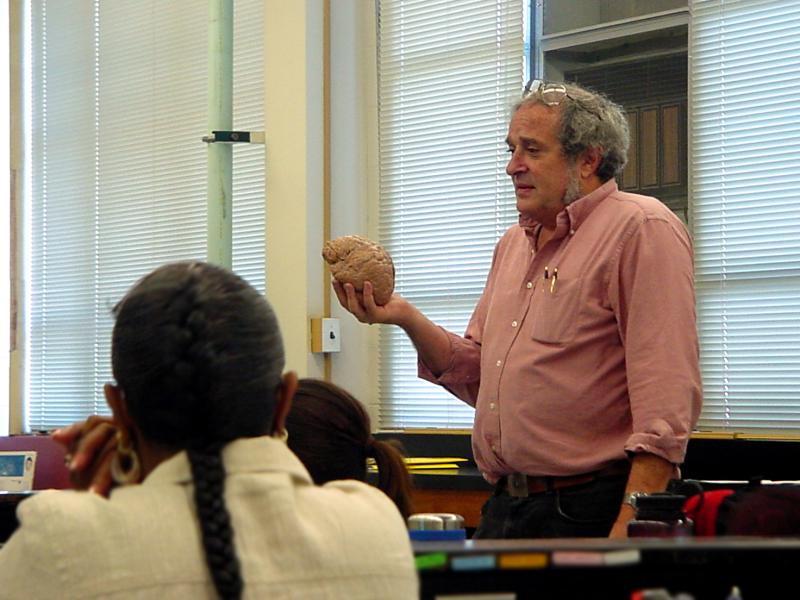Serendip is an independent site partnering with faculty at multiple colleges and universities around the world. Happy exploring!
Notes Towards Week 5 (Sept. 27): Extraordinary "Sense," Parts III and VI with Anne
I. Kaye: coursekeeping and
II. "bringing home" what we were up to last week
III. Anne: Mad @ School
a profound challenge to what is "sensible," what "makes sense":

Sense and Sensibility: The Movie
applying the theory/activism of disability studies to
transform the way academic thinking is understood,
by highlighting the inadequacy of our currents models of mental dis/abilty,
our distrust of "thinking differently," our reliance on standards of
rationality, participation, independence, coherence and collegiality
to measure who is "fit" for the classroom--and for life:
these are medical (=social) judgments about who is teacherly and teachable
(analogous to/intra-acting with the "medical judgments" once passed about
homosexuality, now being passed about transgender, transexuality, intersex....)
A number of you linked this, in the course forum, back to our discussions of utopia
(and hey: thanks for more intra-active conversation this week!)
sel209: the world I am left with when I conjure up the image of a true utopia is a world filled
with sameness, a place that guarantees the loss of diversity and depth, and it’s grey, bleak,
flat, and meaningless-->
charlie: I am really glad that you brought these questions up .… For example … our class …
all have such different academic disciplines, economic backgrounds, grades, schools, athletic
levels, and so much more, which make our discussions so interesting and fulfilling. If you level
this in any way, where's the perfection and utopia then?-->
jfwright: It's funny you mention this, Charlie, because our discussion of utopia had me thinking
about the exact same thing…the Handicapper General … decides how to deal with those people
whose abilities and disabilities need to be evened out. This society isn't equal, because someone
is issuing top-down instructions… In addition, the only way in which people see for excelling is in
this power structure. Without needing to excel, how could society advance?
To explore this notion of changing thinking about thinking in
the classroom (to change up the notion of "exceling"?)
we're going to create a "barometer" with our bodies.
(Bracken and Thomas, qted. by Price, p. 15):
"human mental life ... is not 'some sort of enclosed world residing inside the skull,'
but is constructed 'by our very presence and through our physical bodies' "
and in our social settings through time and space.
Please stand in a single line.
I will read a series of sentences from Margaret Price's book
(selecting discriminatingly from those below....);
if you agree w/ the statement, please move towards the screen;
if you disagree, please move towards the stairs.
Please explain yourself, first to those closest to you, then to us all.
If hearing these explanations affects your position,
please re-locate your body accordingly.
"If you are crazy, can you still be of sound mind?" (p. 1) --yes to the screen, no to the stairs
"Madness is usually not threatening" (p. 1).
"Human life is a form of mental illness" (Lawrence Davis, qted. p. 3).
"disability is a mode of human difference ... that becomes a problem only when the environment ... treats it as such .... it shifts the "problem" of disability away from individuals and towards institutions and attitudes" (p. 4).
"the most important common topoi of academe ... include rationality, criticality, presence, participation, resistance, productivity, colegiality, security, coherence, truth, independence" (p. 5).
"Why is 'coherence' one of the most-often emphasized features of a thesis-driven academic argument; does the demonstration of coherence indicate a stronger mind?" (p. 6)
"Those of us who do function successfully in academe tend to pass much of the time" (p. 7).
"For thousands of years academe has been understood as a bastion of reason ....
Academic discourse operates ... to abhor mental disability--to reject it, to stifle and expel it" (p. 8).
"We might reconstruct 'normal' academic discourses to become more accessible for all .... to measure up to us" (pp. 8-9).
"As with queer, the broad scope of mad carries the drawback of generality but also the power of mass" (p. 10).
[Let us] "redesign our social and work environments, emphasizing the importance of interdependence" (p. 13).
"neurodiversity acts as a positive force in human evolution, enabling alternative and creative ways of thinking, knowing, and apprehending the world" (Antonetta, qted. p. 16).
"we need a way of taking inclusively about people for whom access to human interaction is problematic" (Montgomery, qted. p. 19).
"Many of us are mad at school" (p. 20).
"incorporating narratives of experience is one way to improve access to academic prose .... stories I like best ... render their own occasions of telling ... explain how and why they came about" (p. 23).
"attention to discourse is foremost an activist goal" (p. 29).
"madness [is] a radical disunity of perception from that held by those who share one's social context" (p. 32).
"we practice academic discourse ... as a project of social hygiene ... to diagnose, cure, contain, or expel the mad subject .... to protect academic discourse as a 'rational' realm" (p. 33).
[cf. Haraway on the 'god-trick,' and Nagel on the 'view from nowhere': academic discourse] "claims a gaze that comes from nowhere and everywhere all at once, omniscient and unlocatable, and therefore shielded from any countergaze" (p. 35).
[for] "rhetors whose worlds may be ... composed of ways of knowing fundamentally invested in dis/order and non/sense ... attempting to voice the 'truth' of mental disaiblity creates a paradox ... producing rhetoric whose very authenticity destroys its fluency" (pp. 38-39).
"Dialogue ... is impossible ... because ... power relations between raced, classed, and gendered students and teachers are unjust .... all voices in the classroom ... cannot carry equal legitimacy" (Ellsworth, qted. p. 40).
"Is it possible to listen to the mad subject?" (p. 42).
"Critical pedagogy ... requires an uncomfortable state of mind .... fear manifests as resistance .... loss of composure [is an] educational opportunity" (p. 46).
"stop seeing emotion, pain, and trauma as ... anti-intellectual, and solipsistic, and instead ... recognize them as ways of knowing" (p. 50).
[let's] "focus on the disabling aspect of some teaching" (Lewiecki-Wilson and dolmage, qted. p. 55).
Price says that her argument "requires a disorienting shift away from presumptions of tragedy,
courage, or brokenness" (p. 4). Does applying it to the current stories you know about being
gay, bisexual, transgender, transexual, intersex, queer, questioning, asexual ....
require any disorienting shifts?
Amophrast: Problems: world is constructed for gendered people. World is constructed for able-bodied people -->
someshine: I'd like to build into your question, Amphrast, by asking how anyone thinks film/television representations ... create entanglement between disability and gender ... when those being represented are not (being allowed/offered the opportunity) representing themselves....
(Discuss this w/ 2 or 3 folks positioned "closest" to you).
Here's another question for break and/or Serendip:
does applying Price's argument to the current draft
of your paper require any disorienting shifts?
IV. breaking for eating, stretching, renewing, refocusing...
V. Kaye: See What I’m Saying: The Extraordinary Powers of our Five Senses
VI. Paul, the brain and the black hole
questioning the accuracy of those perceptions...
depending on what "labels" we use (1.jpg) or
what "browser" we're using (Firefox, internet explorer),
whether we've cleared our caches (remember those "memory palaces"?!)
both in our browsers and in our own lived/embodied memories
phenoms: "Problems are not simply conditions …
there is also a perceptual, interpretive element"



